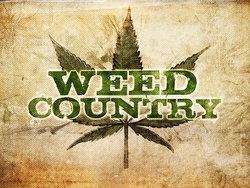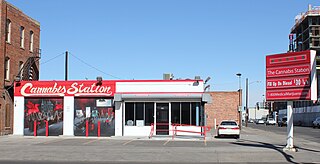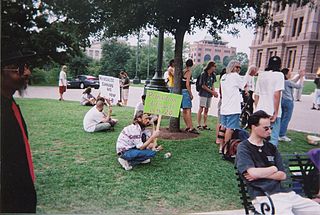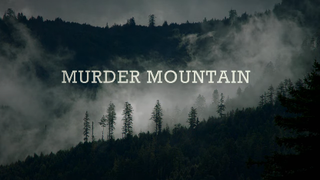Related Research Articles

Proposition 215, or the Compassionate Use Act of 1996, is a California law permitting the use of medical cannabis despite marijuana's lack of the normal Food and Drug Administration testing for safety and efficacy. It was enacted, on November 5, 1996, by means of the initiative process, and passed with 5,382,915 (55.6%) votes in favor and 4,301,960 (44.4%) against.

The Emerald Triangle is a region in Northern California, named as such due to it being the largest cannabis-producing region in the United States. The region includes three counties in an upside-down triangular configuration:

The Campaign Against Marijuana Planting (CAMP) is a multi-agency law enforcement task force managed by the California Department of Justice and composed of local, state and federal agencies organized expressly to eradicate illegal cannabis cultivation and trafficking in California. Since its establishment in 1983, more than 110 agencies having participated, making CAMP one of the largest law enforcement task force in the United States.

In the United States, increased restrictions and labeling of cannabis as a poison began in many states from 1906 onward, and outright prohibitions began in the 1920s. By the mid-1930s cannabis was regulated as a drug in every state, including 35 states that adopted the Uniform State Narcotic Drug Act. The first national regulation was the Marihuana Tax Act of 1937.

The use, sale, and possession of cannabis containing over 0.3% THC by dry weight in the United States, despite laws in many states permitting it under various circumstances, is illegal under federal law. As a Schedule I drug under the federal Controlled Substances Act (CSA) of 1970, cannabis containing over 0.3% THC by dry weight is considered to have "no accepted medical use" and a high potential for abuse and physical or psychological dependence. Cannabis use is illegal for any reason, with the exception of FDA-approved research programs. However, individual states have enacted legislation permitting exemptions for various uses, including medical, industrial, and recreational use.

Cannabis in Oregon is legal for both medical and recreational use. In recent decades, the U.S. state of Oregon has had a number of legislative, legal, and cultural events surrounding use of cannabis. Oregon was the first state to decriminalize the possession of small amounts of cannabis, and among the first to authorize its use for medical purposes. An attempt to recriminalize possession of small amounts of cannabis was turned down by Oregon voters in 1997.

In the United States, the use of cannabis for medical purposes is legal in 38 states, four out of five permanently inhabited U.S. territories, and the District of Columbia, as of March 2023. Ten other states have more restrictive laws limiting THC content, for the purpose of allowing access to products that are rich in cannabidiol (CBD), a non-psychoactive component of cannabis. There is significant variation in medical cannabis laws from state to state, including how it is produced and distributed, how it can be consumed, and what medical conditions it can be used for.
Operation Green Sweep was a series of drug raids conducted by over 200 United States Army soldiers, National Guardsmen, and federal agents in Humboldt County, California. The operation was the first time active-duty troops were used to combat marijuana growing in the United States. The joint federal and state operation led by the Bureau of Land Management was centered around eradicating marijuana and removing agribusiness paraphernalia from the King Range National Conservation Area, federal land administered by BLM near Petrolia, California.

Cannabis in California has been legal for medical use since 1996, and for recreational use since late 2016. The state of California has been at the forefront of efforts to liberalize cannabis laws in the United States, beginning in 1972 with the nation's first ballot initiative attempting to legalize cannabis. Although it was unsuccessful, California would later become the first state to legalize medical cannabis through the Compassionate Use Act of 1996, which passed with 56% voter approval. In November 2016, California voters approved the Adult Use of Marijuana Act with 57% of the vote, which legalized the recreational use of cannabis.

California Proposition 19 was a ballot initiative on the November 2, 2010, statewide ballot. It was defeated, with 53.5% of California voters voting "No" and 46.5% voting "Yes." If passed, it would have legalized various marijuana-related activities, allowed local governments to regulate these activities, permitted local governments to impose and collect marijuana-related fees and taxes, and authorized various criminal and civil penalties. In March 2010, it qualified to be on the November statewide ballot. The proposition required a simple majority in order to pass, and would have taken effect the day after the election. Yes on 19 was the official advocacy group for the initiative and California Public Safety Institute: No On Proposition 19 was the official opposition group.

Washington Initiative 502 (I-502) "on marijuana reform" was an initiative to the Washington State Legislature, which appeared on the November 2012 general ballot, passing by a margin of approximately 56 to 44 percent. Originally submitted to the Washington Secretary of State during the summer of 2011, enough signatures were collected and submitted by December to meet the required 241,153 signatures, sending it to the legislature. When the legislature adjourned without action in April, Initiative 502 automatically advanced to the November 2012 general ballot. It was approved by popular vote on November 6, and took effect over the course of a year, beginning with certification no later than December 6, 2012. Along with a similar Colorado measure, Initiative 502 was credited for encouraging voter turnout of 81%, the highest in the nation.

Weed Country is an American reality television series that aired on the Discovery Channel. The series premiered on February 20, 2013, during Discovery Channel's programming block titled "Weed Wednesdays". The series followed dealers, growers and patients of the marijuana trade located within the Emerald Triangle, along with the enforcers of the law at the Siskiyou County Sheriff's office.

Cannabis dispensaries in the United States or marijuana dispensaries are a local government regulated physical location, typically inside a retail storefront or office building, in which a person can purchase cannabis and cannabis related items for medical or recreational use. First modeled in Amsterdam in the late 1970s where they were innocently called coffee shops, it would take the Americans more than a generation to successfully duplicate the idea of a retail cannabis storefront. Unlike in the Dutch coffee shops, today dispensary customers are prevented from consuming cannabis on the site of a regulated dispensary in all known markets.

Cannabis in Texas is illegal for recreational use. Possession of up to two ounces is a class B misdemeanor, punishable by up to 180 days in prison and a fine of up to $2000. Several of the state's major municipalities have enacted reforms to apply lesser penalties or limit enforcement, however.

Cannabis in Arizona is legal for recreational use. A 2020 initiative to legalize recreational use passed with 60% of the vote. Possession and cultivation of recreational cannabis became legal on November 30, 2020, with the first state-licensed sales occurring on January 22, 2021.

Cannabis in Washington relates to a number of legislative, legal, and cultural events surrounding the use of cannabis. On December 6, 2012, Washington became the first U.S. state to legalize recreational use of marijuana and the first to allow recreational marijuana sales, alongside Colorado. The state had previously legalized medical marijuana in 1998. Under state law, cannabis is legal for medical purposes and for any purpose by adults over 21.

Murder Mountain, originally marketed as Murder Mountain: Welcome to Humboldt County, is an American true crime documentary television series that premiered on Fusion TV on September 23, 2018. Netflix picked up the series and it premiered on the platform on December 28, 2018. The show covers an area of Northern California's Humboldt County, including the local marijuana industry, and multiple disappearances and murders that have occurred in the surrounding mountain range. Much of the show follows the case of 29-year-old Garret Rodriguez, a cannabis grower who was found murdered in the region in 2013.

Cannabis tourism, also called marijuana tourism, is travel/tourism related to cannabis or incorporating cannabis use.
The Kentucky Marijuana Strike Force, also known as the Kentucky Governor's Marijuana Strike/Task Force, is a multi-agency law enforcement task force managed by the Office of the Governor of Kentucky and Kentucky State Police Marijuana Suppression Branch, and composed of local, state and federal agencies organized expressly to eradicate illegal cannabis cultivation and trafficking in Kentucky. The task force was established in 1990, to combat marijuana cultivation on public lands in Kentucky that ranks third in the United States, behind California and Tennessee. An estimated $1 billion worth of marijuana in seized in Kentucky annually.
References
- ↑ Matheson, Whitney (February 13, 2016). "Discovery Channel introduces 'Weed Wednesdays'". USA Today. Retrieved May 24, 2022.
- ↑ Zimmerman, Phil (February 22, 2013). "Discovery Channel Goes Inside the Underground World of Pot Growers". Discovery. Retrieved May 24, 2022.
- ↑ Kemp, Kym (February 10, 2013). "Pot Cops — A Look Inside the First Episodes of the New Discovery Channel T.V. Series Filmed Here in Humboldt". Lost Coast Outpost. Retrieved June 6, 2021.
- ↑ Crane-Murdoch, Sierra (November 1, 2015). "War in Weed Country". Vice. Retrieved May 24, 2022.
- ↑ McKay, Hollie (April 13, 2016). "Exclusive: New Discovery Channel series 'Pot Cops' chronicles marijuana crackdown". Fox News. Retrieved May 24, 2022.
- ↑ Associated Press (February 19, 2013). "Weed Country,' 'Pot Cops' coming to Discovery". The Florida Times-Union. Retrieved May 24, 2022.
- ↑ "Pot Cops: Cast". TV Tango. Retrieved June 6, 2021.